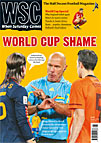 At the 2010 World Cup, England underperformed at a major tournament. Again. Although the same solutions are called for, nothing seems to change
At the 2010 World Cup, England underperformed at a major tournament. Again. Although the same solutions are called for, nothing seems to change
All the stock phrases came out as England staggered through the group stage at the 2010 World Cup en route to a second-round mercy killing in Bloemfontein. The team just needed to step up, the pundits said, play at their best, find their real form. However limp the performances might be, there is still a belief than an England team should be able to compete on equal terms with the best international sides at any given time.
Why this myth persists is difficult to explain other than as a sort of collective amnesia. Whatever the personnel, the results are essentially the same. Although England dispensed with tradition this year, it had usually been the case that a dramatic, closely contested defeat is preceded by series of poor performances. None more so than at the most over-mythologised of tournaments, the 1990 World Cup, when they were never better than ordinary until the semi-final. In fact, England haven’t played consistently well through the group stage of a major competition since 1982.
Even that was preceded by a shambolic qualification when defeat to Norway made it likely that they would fail to reach a World Cup finals for the third time in a row (salvation only came from rivals Romania losing at home to Switzerland). That game in Oslo was regarded as one of England’s worst ever results; the current team looked set to create a new benchmark in South Africa when they went 4-1 down to Germany with 20 minutes still to go.
Whenever England flop, the same technical deficiencies are always highlighted: they can’t retain possession; their movement off the ball is poor; they lose concentration, especially in defence. All of these are true, some of the time. We know how these problems are meant to be rectified: individual skills need to be encouraged early on; school-age teams shouldn’t play on full-sized pitches; coaches should be better trained; competitive dads should be banned from shouting “Get stuck in!” and all the rest of it.
Since England first entered international competition a little over 60 years ago they have been struck by a seismic shock roughly once in every generation: two heavy defeats to Hungary in 1953-54; failure to qualify for successive World Cups in the 1970s; then again in 1994. Remedies are called for, nothing much happens, the cycle repeats. The cumulative effect is that England players are almost always frozen with fear when they enter major tournaments, weighed down more by the expectation of failure than the pressure placed on them to succeed. While Italy and Germany are cited as the examples to which to aspire, England’s overall record – one final appearance and three semis – is the same as Sweden’s.
This time has been different in one respect. After previous failures, mistakes in the squad selection would be highlighted – we’d see lists of overlooked players who would supposedly have made a difference. That can’t be done now. Even the most one-eyed Little Englander among the football commentariat wouldn’t dare to argue that the absence of the injured Owen Hargreaves and Rio Ferdinand had a decisive effect.
This was just about the best squad it was possible to pick. Of course, it would help if more English players featured regularly at the top level but the clubs are under no obligation to assist the national side. Products of the academy system will continue to get loaned out to lower division clubs while first-team squads are stocked up with overseas players who are technically better. Nonetheless, optimists can see some stirrings at academy level, with England’s Under-17 team having won the European Championship this year, which was their first age group trophy of any kind since 1993. In 2009, the Under-19 and Under-21 teams also reached European finals although the latter, including Joe Hart, James Milner and Theo Walcott, were thrashed 4-0 by Germany.
Football has been an important part of popular culture in England since the 19th century. Crowds are at their highest in 40 years throughout the divisions. There are more professional clubs here than anywhere else in Europe, possibly the entire world barring Brazil, which has three times the population. We’re as keen as can be when it comes to football, just not especially good at playing it. The latest plans for wholesale reform, painstakingly laid out in every newspaper since this summer’s flop, might have some effect if they’re carried through. But members of the current youth squads will be at the veteran stage before any benefits are felt. Good luck, Fabio, in the meantime.
From WSC 282 August 2010